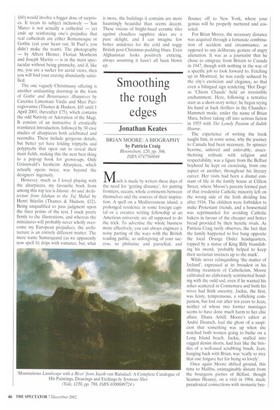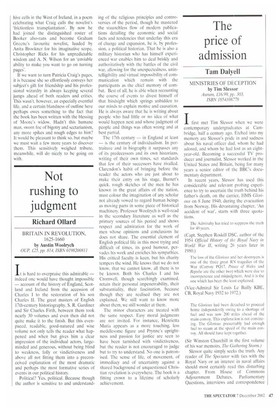Smoothing the rough edges
Jonathan Keates
BRIAN MOORE: A BIOGRAPHY by Patricia Craig Bloomsbury, £20, pp. 306, ISBN 0747560048 Much is made by writers these days of the need for 'getting distance', for putting frontiers, oceans, whole continents between themselves and the sources of their inspiration. A spell on a Mediterranean island, a prolonged residence in some foreign capital or a creative writing fellowship at an American university are all supposed to do the trick. To advertise the whole business more effectively, you can always engineer a noisy parting of the ways with the British reading public, so unforgiving of your success, so philistine and parochial, and
flounce off to New York, where your genius will be properly nurtured and cosseted.
For Brian Moore, the necessary distance was acquired through a fortunate combination of accident and circumstance, as opposed to any deliberate gesture of angry alienation. It was as a journalist that he chose to emigrate from Britain to Canada in 1947, though with nothing in the way of a specific job to look forward to. Fetching up in Montreal, he was easily seduced by the city's exoticism and elegance, so that even a bilingual sign rendering 'Hot Dogs' as `Chiens Chauds' held an irresistible enchantment. Here, following a tentative start as a short-story writer, he began trying his hand at hack thrillers in the ChandlerHammett mode, under the name of Brian Mara, before taking off into serious fiction in 1955 with The Lonely Passion of Judith Hearne.
The experience of writing the book taught him, in some sense, why the journey to Canada had been necessary. Its spinster heroine, unloved and unlovable, anaesthetising solitude with religion and respectability, was a figure from the Belfast boyhood he kept on exorcising, from one aspect or another, throughout his literary career. Her visits had been a dismal constant of life in the family house at Clifton Street, where Moore's parents formed part of that irredentist Catholic minority left on the wrong side of the Irish dividing line after 1916. The children were forbidden to make Protestant friends, and a housemaid was reprimanded for avoiding Catholic bakers in favour of the cheaper and better bread provided by their heretic rivals. As Patricia Craig tartly observes, the fact that the family happened to live bang opposite the local Orange Order headquarters, topped by a statue of King Billy brandishing his sword, 'probably helped to keep their sectarian instincts up to the mark'.
While never relinquishing 'the matter of Ireland', expressed at its broadest in his shifting treatment of Catholicism, Moore cultivated no elaborately sentimental bonding with the ould sod, even if he wanted his ashes scattered in Connemara and both his wives had Irish ancestry. Jackie, the first, was feisty, tempestuous, a rollicking companion, but lost out after ten years to Jean, neither of whose two former marriages seems to have done much harm to her chic allure. Diana Athill, Moore's editor at Andre Deutsch, had the ghost of a suspicion that something was up when she watched both women going to bathe on a Long Island beach. Jackie, stuffed into ragged denim shorts, had hair like the bristles of a well-used scrubbing brush. Jean, hanging back with Brian, was 'really so nice that one forgave her for being so lovely'.
Once again Moore shifted ground, this time to Malibu, unimaginably distant from the bourgeois pieties of Belfast. though Seamus Heaney, on a visit in 1984, made paradoxical connections with monastic bee hive cells in the West of Ireland, in a poem celebrating what Craig calls the novelist's 'frictionless transplantation'. By now he had joined the distinguished roster of Booker also-rans and become Graham Greene's favourite novelist, lauded by Anita Brookner for his imaginative scope, Christopher Ricks for his unpredictable wisdom and A. N. Wilson for an 'enviable ability to make you want to go on turning pages'.
If we want to turn Patricia Craig's pages, it is because she so effortlessly conveys her subject's gift for friendship and his professional wizardry in always keeping several jumps ahead of both readers and critics. This wasn't, however, an especially eventful life, and a certain blandness of outline here perhaps owes something to the fact that the book has been written with the blessing of Moore's widow. Hadn't this humane man, sworn foe of bigotry and sectarianism, any more spikes and rough edges to him? It would be pleasant to think so, but maybe we must wait a few more years to discover them. This sensitively weighed tribute, meanwhile, will do nicely to be going on with.











































































 Previous page
Previous page